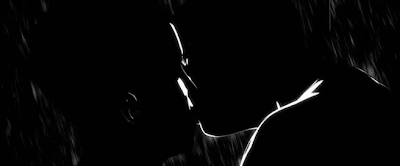
Dark in look and feel, Renaissance is a film whose only grays are between the things we normally look at. The sharp angular lines of the city, structures, and characters' faces, conceal the fact that character-wise, they are anything but black and white, though in the end dark could be used to describe them all; dark pasts, dark acts, dark motives and methods and secrets.
Please note: Entries about media reviewed in this blog are written from the framepoint that the reader has already seen the work in question. Plot twists and endings will sometimes be examined.
As an animated film which uses the same rotoscoping technology as "Waking Life" and "A Scanner Darkly" (both by Richard Linklater), Renaissance boasts a distinct visual look. Unlike those two films, however, Renaissance takes things to another level, by reducing the palette to only black and white giving it a feel more reminiscent of the older film noirs it resembles thematically. Stylistically it's in the same ballpark as "Sin City", but whereas that film used color to bring important details to life, there are is virtually no color in Renaissance, and for that matter almost no grays either; everything seems fall within the catagory of being either light or shadow. At times we feel like what we're looking at is actually invisible and what we can "see" is merely the shadow or after-effect of the subjects we are trying to follow. It lends itself quite well to a story such as this, full of mystery, secrets, and clues hidden within the details. The saga is full of shifting alliances, culprits hiding in plain view, and plot twists which linger just around the corner and can felt before we actually see them.
The story itself is quite spare, and like many of the better film noirs it relies heavily on exposition, terse dialogue, and a slowly unfolding plot to maintain its air of secrecy. Think neo niors like Heat and L.A. Confidential though due to its futuristic elements works like Blade Runner (another sci-fi noir with sparse dialogue and a lot of atmosphere) and the anime Cowboy Bebop might be more on target. Even the romantic subplot of the film (probably its most heavily dramatic portion) is sparing when it comes to words: "I bet you meet a lot of flawless women in your line of work."

Karas and Bislane

The setting is a distopian Paris set in the not too distant future where the Eifel Tower can still be seen, and many new, tall and impressive buildings have been erected to tower over the slums and alleys where the parasites still live and continue to commit their petty crimes as they have since cities came into existance. An impressive opening shot pans down from the Eifel tower itself, lower and lower into the seemy underbelly of the metropolis. At a dingy techno-club a girl named Bislane dances on the floor. Unbenounced to her, her younger sister Ilona has come to the club to see the owner and bartender, Dimitri, with a dark purpose in mind. He's stolen something for her, a book the plot will later reveal, which contains the secret of immortality. Dimitri tells Ilona he had some trouble getting what she wanted, sleezily lets her know the price has gone up and then, after getting into a minor scuffle with her is confronted and told to leave by Bislane who finds the two where they are arguing on the balcony. Ilona will leave empty handed only to be abducted, setting in motion a plot that focuses on the search for her whereabouts, the hidden motives behind why she was taken, and what is at stake in her return.

Two exemplary images of noir
Above: Bislane in front of the Paris Skyline
Below: Reflection in the eye of Ilona's dead dog, the only witness to her abduction

A mega-company called Avalon looms above all else in the city of Paris in Renaissance. It employs the best and brightest (including the two sisters mentioned previously), and it maintains an iron grip on all. Our main character is Karas, a character like many we've seen in another film. He's tough and possesses a strong sense of justice, and is willing to bend the rules to do what he feels is right. In an early scene we watch him break protocol on a hostage situation to take out three kidnappers who have a young boy held at gunpoint. He seems to have as little regard for his own life as he does for operating procedure.
Over the course of the film, Karas will meet several important characters. Jonas Muller is a brilliant scientist and was a mentor to Ilona. Farfella is a shadowy gangster and childhood friend to Karas (the kind of friend who's useful when one wants to skirt the law, as Karas will have to later in this film). The slimy Dellenbach is the head of Avalon who bugs Karas's comm device, and later has Dimitri killed and attempts to abduct Muller with thugs who use a type of thermo-camouflage (the latter of which sets off a pretty interesting shootout in a greenhouse). Eventually Karas will get kicked off the force and have to rely upon Bislane to access information from Avalon which sets off a romantic subplot between the two. The final major character to be introduced is the elderly Nakata who was on the same team as Muller during a crucial project. He reveals the secret of their research that everyone seems to be dying to get their hands on: immortality. Muller, it turns out, had a younger brother with Progeria, a disease which causes hyper-rapid aging, and by trying to counteract it, it seems he's discovered the means to eternal youth.

Above: Another image reminiscent of classic noir, two silhouettes kissing in the rain
Below: Thermo-camouflaged soldiers


All of this leads to a confrontation as Karas and Dellenbach's men close in on Ilona's whereabouts at the same time and Karas is forced to choose between killing Ilona to keep Muller's secret or allowing her to live and reveal it to Avalon. On the one hand, Muller has died for the secret already and entrusted the choice to Karas. "Avalon cannot be allowed to obtain such limitless power. Without death life will become meaningless..." On the other hand, Karas has promised Bislane, now his current lover, that he will save Ilona, even though it has been decided beforehand that she will have to go into hiding and take on a new identity.
Things do not go as expected when Karas finally reaches Ilona. She has been held against her will by Muller (now dead) and his younger brother, who constitutes the one piece of evidence Muller couldn't destroy. When Karas arrives Ilona is trying to do just that, until Karas stops her from choking him to death. Ilona reveals herself to be completely selfish and willing to accomodate Avalon. She rejects the premise of taking a new identity and even tells Karas of her intention to take credit for Muller's work, saying "The world is waiting for MY discovery." After suffering a gunshot wound to his shoulder from one of Dellenbach's henchmen, Karas finds himself incapacitated and unable to physically restrain her and takes her life with his gun after she throws away the new identity he gives her and begins to defiantly march back to Dellenbach. When talking with Bislane afterward, Karas doesn't let on what happened with Ilona's death, choosing instead to let her sister retain a positive memory and the belief that she is still out there safe and alive.


* * *
Thematically, Renaissance is fairly ambiguous, even while the question of morallity when it comes to eternal life is a big one. "Without death, life is meaningless", utters the character of Muller right before he expires. And with the brisk pace the plot continues we viewers are given little time to contemplate this until the lights come back on and the question resurfaces in our minds.
I remember the first time I saw the movie with a friend we ended up having a long discussion about the ending. He was ticked off at the decision Karas had made, feeling immortality was something which should have been allowed into Avalon's hands. I've often wondered if there isn't something inherently corrupt in the very idea of eternal life. Few can deny the power it would confer on those who possess it, and power as we all know, corrupts.
What if eternal life were made into a product? Should it really? Who decides who lives and who dies, and in the end is all of it merely a matter of money or favors? In many ways we live in something of a similar system already where those with large amounts of money or influence survive much longer despite sometimes having far worse ailments. The poor who become sick or infirm or just plain old suffer as their bodies slowly break down, addicted to medicine or life saving treatment, but what if there were a source of immortality and we all knew we could live on forever and not just for a few more years if only we could afford to pay the price... Movies like this one reflect the real world in a real way, and businesses like the fictional Avalon are not a far cry from the dirty pharmaceutical companies that deny medicine to the dying if there isn't a profit in it for them to make.
Another question I'd have to consider is what even if immortality were granted to the common man would be his future? Imagine being a slave for all eternity, with no release ever to be seen. It's been often said that there are fates worse than death, and with death no longer a master to us, who would be left? That human beings can be far crueler than death is something I have little doubt of, and characters like the villain Dellenbach make it quite believable that immortality might not just be the end of death's great menace, but also the beginning of an endless living hell as humans without scruple acquire what damn near amounts to godhod. Richard Dawkins once argued that death coupled with reproduction could actually be seen as a very big advantage to immortality, largely due to the ability to start over, brand new from scratch, and potentially fix the problems within a previous version of any creature.
Like the Watchmen movie which was adapted from the graphic novel of the same name, Renaissance doesn't give its viewers answers to these questions per se. Instead it merely shows us the decisions of its characters, leaving us to ponder them and whether or not we agree or disagree.

No comments:
Post a Comment